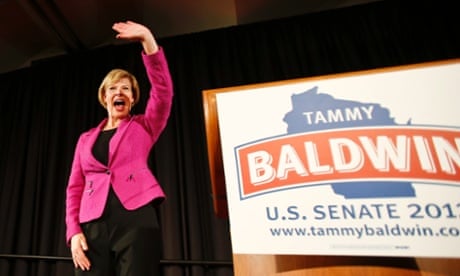It was not so long ago – 2010, to be exact – that the best gay rights proponents could hope for on election day was for civil rights not to be pruned back further. In 2004, 11 states voted to define marriage as "between a man and a woman". In 2006, seven states took the same step. In 2008, three. 2010 was a banner year: gay marriage bans weren't on the ballot anywhere. Invisibility has often been the only option for those seeking some form of equality, but it's not a sustainable way of being.
Tuesday night saw the largest expansion of gay rights in American electoral history, as Maine, Maryland and Washington became the first states to approve of marriage equality by popular vote and Wisconsin elected Representative Tammy Baldwin as the nation's first openly gay senator. My adopted home state of Minnesota became the second state to reject a constitutional ban on same-sex marriages – amendments that have passed in 30 other states since 1998, including in the first state to reject one, Arizona.
Marriage equality has moved forward mostly through the courts, gaining legal status inch by inch, even as popular culture sailed blithely ahead. There has probably been no cause in American history in which our national imagination about progress and the lived reality of those who want it have been so far apart.
While the civil rights struggle as it pertains to race is still hardly over, the problem facing non-whites is their lack of representation in popular culture more than it is a too-rosy portrayal. To judge by the Bravo network, you'd think that gay marriage was not just legal, but mandatory – and that, of course, may have been part of the problem. Americans remained squeamish about gay rights because so many saw the movement proceeding without a sense of their having said that was OK with them.
So what has changed? A 2010 New York University study found that voters decided against gay marriage ballot initiatives for the reasons they decide against most things: campaigns don't change people's minds.
"Neither advocates nor opponents tended to gain support in any consistent fashion in these campaigns, despite the millions of dollars spent by both sides over the past decade."
If that study's findings can be applied to Tuesday night's results, there is good news and bad news for backers of marriage equality: the good news is that you've won the argument; the bad news is that you might not have needed to spend quite as much money as you did. Gay rights have inertia, not momentum, on their side: the effort it takes to convince someone to oppress someone else has become greater than the effort needed to maintain the status quo. This is civil rights not as the unstoppable force, but the immovable object.
Bravo and "Modern Family" may have helped make that the case, though I suspect that it's actually the failure of anything else to change since gays and lesbians have come more and more into public life that is more persuasive (no hellfire, no damnation!). Gays are everywhere … and all I got was this lousy sit-com.
Indeed, while expansion of the right to marry will have a more immediate effect in lives of gays and lesbians, a crucial argument for that expansion is that gay marriage won't change anything else. Your marriage will be fine (… if, you know, it started out that way).
If we're looking for an event that will reverberate in history, it's Tammy Baldwin's victory that has a reach far beyond Wisconsin. She was an understated candidate: a combination of our pop-culture norms (and perhaps midwestern "nice") made it next-to-impossible for her opponent to use her sexuality against her in the ways that might have seemed acceptable a generation ago. Many of my friends in Minnesota, most of whom have relatives in the neighboring state of Wisconsin, didn't even know she was gay. Maybe that's the point – if you're a straight person. If you're gay, however, it's something you'll never forget.
We Americans probably make too much of the idea that equality means "anyone can grow up to be president", but the reach of one's dreams is what civil rights are really about: less a useful metric than a testament to the psychic cost of entrenched bigotry. One's horizons can only extend if you are able to look up and see progress.
It took less than 50 years for the US to go from the first black senator of the modern era to the first black president. How long it will take to get to the first gay president is perhaps less important than being able to imagine that there could be one.
There's a saying in Washington, a quip, about the self-importance that comes with being in Congress' higher body:
"Every morning, 100 senators look in the mirror and see a president."
Because of Tammy Baldwin, every morning, that many more children can look in the mirror and see one, too.








